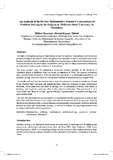Please use this identifier to cite or link to this item:
https://cris.library.msu.ac.zw//handle/11408/1606Full metadata record
| DC Field | Value | Language |
|---|---|---|
| dc.contributor.author | Chauraya, Million | - |
| dc.contributor.author | Mhlolo, Michael K. | - |
| dc.date.accessioned | 2016-06-21T10:59:23Z | - |
| dc.date.available | 2016-06-21T10:59:23Z | - |
| dc.date.issued | 2007 | - |
| dc.identifier.issn | 1028-8457 | - |
| dc.identifier.uri | https://www.researchgate.net/publication/281586456 | - |
| dc.identifier.uri | http://hdl.handle.net/11408/1606 | - |
| dc.description.abstract | The study investigated a group of mathematics in-service teachers' conceptions of problems and problem solving in the subject. Such conceptions were premised to have a mediatory role on the teachers' predisposition to implement problem solving strategies in their instructional practices. It was motivated by the observation that problem solving was not being implemented effectively in mathematics instructional situations in most schools. The study subjects were 34 mathematics in-service teachers enrolled for the Bachelor of Education degree at Midlands State University in Zimbabwe in 2006. The research instrument was a questionnaire designed to find out what they perceived to be mathematics problems and problem solving. Data was collected during their residential tutorial session in August 2006. The results indicated that the teachers had a view of mathematics problems which was limited to the standard drill exercises and translation tasks which are common in most mathematics textbooks. Such tasks were also rated as having a lot of mathematics content, were useful in teaching, and would be used very often in the subject's instruction. This was found to be a view which was likely to militate against effective implementation of problem solving as an instructional mode. The study recommended the re-examination of mathematics teacher preparation courses so that they make problem solving a more central and critical component of the programme. Availing literature on problem solving to school libraries and mathematics departments could also motivate teachers to utilise this instructional strategy. In-service workshops for practising teachers could be adopted mainly for advocacy purposes. | en_US |
| dc.language.iso | en | en_US |
| dc.publisher | Taylor & Francis (Routledge) | en_US |
| dc.relation.ispartofseries | African Journal of Research in Mathematics, Science and Technology Education;Vol.12, No. 1; p. 72-83 | - |
| dc.subject | Mathematics problems, mathematics problem-solving, in-service teachers’ conceptions, Zimbabwe | en_US |
| dc.title | An analysis of in-service mathematics teachers' conceptions of problem-solving in the subject at Midlands State University in Zimbabwe | en_US |
| dc.type | Article | en_US |
| item.fulltext | With Fulltext | - |
| item.openairetype | Article | - |
| item.languageiso639-1 | en | - |
| item.cerifentitytype | Publications | - |
| item.grantfulltext | open | - |
| item.openairecristype | http://purl.org/coar/resource_type/c_18cf | - |
| Appears in Collections: | Research Papers | |
Files in This Item:
| File | Description | Size | Format | |
|---|---|---|---|---|
| An analysis of in-service Mathematics T...rs' conceptions of Problem Solving.pdf | Abstract | 32.61 kB | Adobe PDF |  View/Open |
Page view(s)
12
checked on Jul 26, 2024
Download(s)
2
checked on Jul 26, 2024
Google ScholarTM
Check
Items in MSUIR are protected by copyright, with all rights reserved, unless otherwise indicated.


